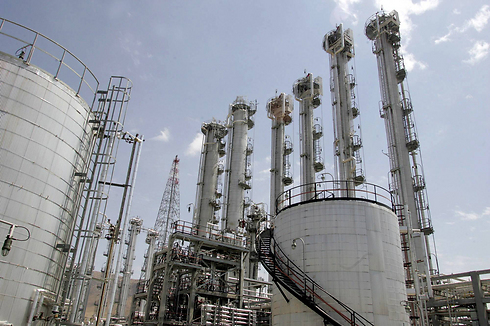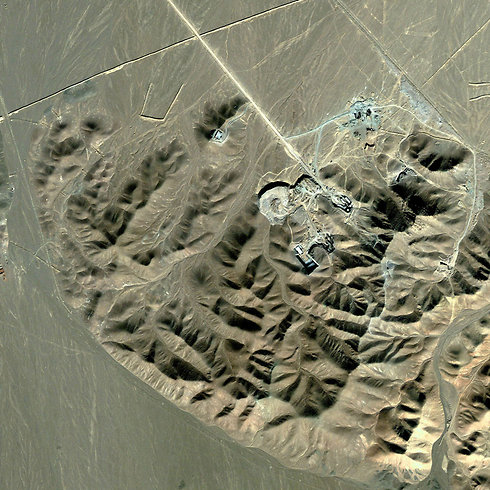With only partial access to military sites and a 24 days warning period prior to inspections, Iran can continue to realize its nuclear ambitions unimpeded; world powers conceded on many of their main concerns during the negotiations.
Many Iranians rushed onto the streets of Tehran on Tuesday night to celebrate what they see as a great victory – an agreement on the country’s nuclear program that would leave Iran a significant portion of its capabilities and remove the sanctions that are choking its economy.
1,500 km away, officials in Jerusalem are warning that the agreement will preserve Iran’s nuclear capabilities, while making effective supervision very difficult. An Israeli government official said Tuesday evening that “According to the agreement, Iran can be warned up to 24 days before being visited by inspectors. It’s as if police who want to raid a drug lab would give the criminals 24 days warning – it is inconceivable.”

Iran, the official explained, will receive $500-700 billion over the next 15 years that will consolidate the ayatollahs’ rule.
“It can be said with certainty that the money will be transferred to support terrorism and other proxy states. Iran can use the money within Iran itself to enforce its uncompromising rule. The money will not serve human rights or economic development that will lead to economic welfare, on the contrary. It will not lead to the government being replaced, but rather the opposite. The regime will only be strengthened,” the official said. “The economic boost that Iran will get it will be used mainly to consolidate its aggressive and terrorist capacity in the area.”
“We will fight this agreement until we have nothing left to fight with. This agreement is as we had feared, a bad one, not good for Israel and the region,” he went on to say.
The Israeli official noted that the agreement might slow down Iran’s nuclear activities but Tehran retains the ability to realize its goals and plans.
“We are convinced that Iran has not abandoned its strategic intention of acquiring nuclear weapons. There is no need to go back in time concerning what Iran wants to do accomplish in the region. Just this Friday it called for our destruction. They must be taken them seriously,” the official said.

“This is a nation determined to establish a foothold in our region through ongoing terrorism. Until now, there have been economic limits to its activity outside Iran. I do not expect Iran to abandon its strategic vision and as proof this agreement has an expiry date. What will happen in 8 years? They are not obligated to the years that follow, and since their aspirations remain, we think we shall encounter Iran and its nuclear ambitions, which are likely to become a reality,” said the official.
Concessions made by world powers
The official presented the starting points which the powers gave up on during the negotiations:
- No recognition of Iran’s right to enrichment in light of past abuses.
- Iran does not need an underground facility and a fortress facility at Fordow.
- Research and development: The powers said that Iran does not need enriched centrifuges.
- Supervision of the International Atomic Energy Agency must be firm and immediate.
- Israel has received more than once clear statements that the “breakout time” between fissile material at a low level of enrichment and fissile material at a high enrichment level needed for a first bomb, would be measured in years.
- Israel requested and was promised, even by the IAEA, that Iran will have to confess and to put all the information about its military nuclear program on the table.
- The Arak heavy water reactor: The powers unequivocally made it clear that Iran does not need a heavy-water reactor for a civilian nuclear program.
Iran’s achievements in the agreement
- Iran received international recognition of its right to enrich uranium. It is allowed to have up to 300 kg of enriched-uranium in its stockpiles, even though it has no civilian use for this amount of material.
- Iran received international recognition of all of its nuclear facilities, including the underground facility in Fordow. The deal does not require Tehran to dismantle or seal any of the sites, nor freeze activity in any of the sites.
- The deal enables Iran to keep 5,600 centrifuges in the bunkers in Natanz, with a thousand more that will remain online in the bunker in Fordow. One third of these centrifuges can enrich radioisotopes.
- Iran is allowed to continue its research and development (R&D) of all advanced models of centrifuges. It will be able to develop centrifuges that are 20-25 times faster than what it currently has, which will affect the breakout time when it decides to produce a nuclear bomb.
- The deal frees Iran of the obligation to confess past issues regarding its military program.
- The deal does not mention Iran’s surface-to-surface missiles project.
Problematic supervision
One of the most problematic issues in the agreement is supervision and the fact the UN’s inspectors will only have partial access to Iran’s military facilities.
“This allows Iran to drag its feel. It’s not like we thought, that the world powers or the IAEA tells Tehran ‘I want to get to neighborhood X, building Y, in a given date two-three days from the time of request,'” the Israel official explains.
“The agreement allows Iran to get a notice of up to 24 days before the inspectors’ visit. Imagine that Iran has a secret military project at a basement or in an apartment. From the moment the request is made by world powers, Iran has 24 days to clean up the site until inspectors arrive. The known sites will have IAEA supervision measures and cameras. But if you want to steal – you’ll do it at an unrecognized site, and then Iran has a 24 days notice,” the official went on to say.
As reported by Ynetnews
